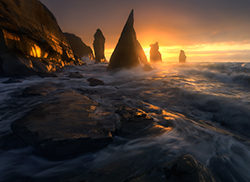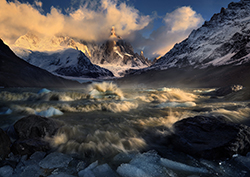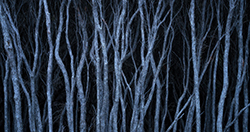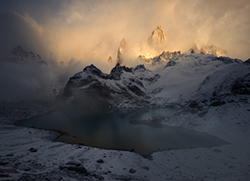
|
|
|||||
|
Featured Photographer, October 2017: Eric Bennett
We are happy to have Eric Bennett as our featured guest photographer this month. We appreciate that he gave us some of his time and generously shared his beautiful photography with us! Please visit his links to see more of his work, and to let him know you enjoyed this interview. :: Eric Bennett: Before starting, I just want to thank you for the opportunity to share more about what I do and love. For anyone reading that may not know much about me, I'll give myself a brief introduction. I was born in Southern California and currently reside in Northern Utah where I have been for the past 5 years. I am 26 years old and have been a full time landscape photographer for the past two years. I spend my free time hiking, camping, skateboarding, and playing with my girlfriend and her two kids. For any gearheads that might be reading this, I currently shoot with a Sony a7r with Canon Lenses and a Really Right Stuff Tripod. :: What got the start with photography as a creative medium? What was it that caused you to branch out to video? So I actually started more with video when I was a teen and because of that I got into photography later on. So Photography is a newer thing for me than filmmaking. In 2014 I quit my job and traveled the world that entire year on savings. I decided to make a film of my travels to try and inspire others to care more about seeing our planet and appreciate the world we get to live in. During those travels I started to mess around and shoot pictures on the side. Later on I found Ted Gore's work and that really impressed me and inspired me to start focusing primarily on photography instead of video. I have always painted and drawn stuff growing up so when I saw that Photography could be so artistic and limitless I had a new desire to create scenes in nature. I felt I was more capable of expressing my love for landscapes through images than videos. :: In terms of video work...how does the pre-visualization of a project differ? What do you find is the biggest difference in what you visualize as to what you find when you get in the field with video? I think something that differs greatly is that photography is just a single moment where video can be as long as you want, can jump forward in time, and allow stories to develop and unfold differently. Whereas in photography you have to tell the whole story in a single moment of time. This makes photography a lot more dependant on aesthetic value, lighting, composition, subject, etc. Video has several other dimensions such as music, narration, and motion that can help you tell more detailed stories. In some ways photography is more of a challenge because you have to convey so much with so little, and in other ways video is more challenging because the projects tend to be a lot bigger and more time consuming. You have to decide on several different locations, lighting, actors, music, etc just to create one product. Photography has more of an instant gratification I feel like. :: Your latest work from Patagonia is awesome...can you talk a little about how you planned for that experience? I know you try to set your style apart from others, and with Patagonia being one of the new hyped places to visit...how much did you look to other work before going? How much did what others had done play into how you planned locations, etc? Thanks a lot! I was really nervous to go to Patagonia. It was a decision I had made in late 2015 that I would go. It ended up getting pushed to April 2017 because of other trips that took priority and I wanted to be there during the fall colors, fall is my favorite season to shoot. About 2 months prior to when I was going to be leaving for Patagonia, I really wasn't feeling like I should go. I had seen so many amazing images from there from guys like Ted Gore, Marc Adamus, Alexandre Deschaumes, and Floris Van Breugal. I just felt like I wouldn't be able to come back with anything new to offer. My very supportive girlfriend convinced me that I should just go because no matter what it would be an experience I would never regret to spend time amongst those incredible mountains. So anyways, I stuck to my decision and ended up going, and I love her for it. I didn't plan shooting specific locations or anything, as I like to keep things spontaneous and just let the weather and light dictate where and what I shoot, I just decided I would spend 3 weeks hiking around in Los Glaciares to shoot Fitz Roy and Cerro Torre and then 10 days in Torres Del Paine to shoot the Cuernos and Las Torres. I went during when it should have been peak fall color and it was pretty nice when I got there, and I felt like if I had stayed long enough I would be able to see some unique weather conditions and have plenty of opportunities for dramatic and interesting light to work with. I always give myself plenty of time while on trips so I can really dial in comps and get the best lighting possible. I hate feeling rushed or like I have to stick with a certain shot because it's the only one I got. :: Other than the business side of landscape photography, which I think most people struggle with these days...what is the toughest part of being an outdoor photographer, and how do you deal with it? I'd say the toughest part is not letting the art consume myself. I get really into it and a lot of other things like relationships or other passions of mine have suffered in the past because of a lack of balance. It's really easy to just spend the entire day on my computer processing images, but this burns you out and affects your social life. I have a girlfriend who I really enjoy spending time with and it's tough to be away on long trips and be invested in something so time consuming. She is really supportive though and never questions my decisions or goals I make so I can progress with my art. The good thing is we aren't living together yet so when I leave my house my work and art stay behind. I go over to her house and I don't think about it anymore, I don't have my phone with me, all my attention is on her and our relationship. I think once we live together it will be hard to discipline myself and resist the temptation to always go onto my computer and work on images or look at images. Its nice to keep it separate and to know that once I am done for the day I am done, this also helps me be more productive while I am working on my art. I also believe that without a healthy social life you stop progressing as a person and without that personal progression the art becomes stagnant as well. :: You have a diverse portfolio when it comes to different environments, mountains, forests, deserts, etc. What is your favorite place to shoot? Which do you find the most challenging. I'd say it's a tie between rugged coastlines and mountains. I really enjoy scenes with water in them such as the ocean, streams, lakes, ice, etc. Mountains are so easy to shoot because big epic peaks make such clear and defined subjects. The desert is extremely challenging for me because I feel it's such a dry and arid place it's hard for me to connect with. The scenes always feel so static and there isn't any cool motion to capture and add to the mood or emotion of the image. I really respect the guys that can create compelling and powerful images in those kinds of places. :: What is your favorite piece of non photography gear and why? I'm not sure if it would be considered gear but I always take along a book in my pack. I constantly read in my everyday life and I love the peace and silence nature allows for me to read in while on photography trips. I think reading is one of the most productive things we can do with our spare time throughout the day. I love learning new things. :: What is the scariest thing that's happened to you on a shoot? I've had a lot of crazy experiences where I wasn't sure if I was gonna make it out alive, but the first one that comes to mind was last year during this lightning storm in Australia. I was with a couple friends in the Blue Mountains on top of this canyon and this crazy storm was coming in. It was raining super hard and lightning was striking as powerfully as I've ever seen it. It kept getting closer and closer to us but we were busy trying to shoot this epic moment. We were up above treeline and we were higher than everything else around us but in my head I thought “nah there is no way I'll get struck by lightning, that just doesn't happen.” Then soon enough I did get hit by a bolt that was close by. I heard this crackling noise all around me and I could feel it hit my head and go down through my body. I didn't fall over or black out or anything but it was quite the shock. It was pretty surprising but it was more of an awesome moment than one of fear. I was just so blown away that it had happened. I'm still not scared of lightning but I am a bit more aware of when to watch out for it. :: Trying to dig up more information on you...I noticed you're not the only Eric Bennett that's a photographer...I know that others share names with folks who share this same profession, I was curious if you've ever had anyone trying to get you on a shoot...but thought it was another Eric Bennett photographer? Haha, thats funny you say that. I've actually been sent movie scripts and emails about projects I have had nothing to do with because people reached out to the wrong Eric Bennett. This one time I got sent this movie script about some teenage zombie movie that was absolutely terrible! Haha. It can be quite entertaining though. That's mainly just with film though, I've never gotten emails from confused people about photography work. :: What are you really trying to push with your photography and video work? What do you want viewers to leave your work having experienced? How do you know if you're successful? Like I kind of mentioned before, I just really love our planet and I want others to love it as well. Really photography is secondary for me and I don't care much about the medium like I do about the subject. I could paint or sculpt or whatever to try and convey my love for nature but I feel like I just happen to be best at photography. I hope people can appreciate wilderness and unaltered, pure nature more through my photography and be inspired to help take care of and preserve these few places we have left. :: I love your intimate work...and the subtle processing that goes into the photos...what challenges you when processing something that is often so subtle with light and textural changes? What's one piece of advice you'd pass on to someone who struggles with processing those kinds of images. Man it was really hard for me to figure out how to process the intimate scenes, and it's because you really have to approach them in a completely different way. Id say less is more and the less steps you can take to get to your final vision the better. It's all about subtle adjustments and keeping them simple, just letting the forms, colors, composition and light speak. If your hand gets too heavy they can really fall apart quickly. These kinds of images are mostly done in camera and I am doing very few adjustments to them in Photoshop. Someone who really helped me figure out how to work the intimate scenes was my buddy David Thompson. Since then I'd say they have become the main kinds of scenes I am looking for while out shooting and the ones I enjoy creating the most. :: What was the best lesson you learned early on, or maybe advice you received from someone whom you admired? What was the biggest bunch of crap you thought was more important than it was in the long run? I think the best lesson I ever learned was that there is a difference between capturing pretty pictures and creating works of art, and what that difference is. I think I came to that realization by looking at work and reading books by guys like Sebastiao Salgado, Guy Tal, and Ansel Adams. Once I felt I was expressing myself clearly and creating art that could speak to others, it really took a turn for me and the whole process became a lot more meaningful and fulfilling. I think the biggest load of crap I have heard is that you can't making a living doing photography. I'm nobody special and I have been able to do photography full time as my only source of income for the past 2 years now. I don't have unique or strategic marketing, or hardly any marketing at all for that matter and I'm not constantly thinking about how to make money with photography either. I've just been focusing on the images and it has been working out for me so far. I think you can make a living doing anything nowadays, the main thing it depends on is just how much money you feel you need in order to live. A lot of photographers tell other photographers this lie and I think this results in people giving up before they even try. I'm glad I had my parents growing up to always inspire me to do whatever I loved for my income. They are both artists as well. :: Where do you see landscape photography in 10 years in terms of creativity and still being a viable profession? How much do true wilderness experiences suffer because of the current trend with photography? I think it will just keep evolving, or maybe the gap between photography, digital art and video will close and they will kind of merge into the same medium. It's hard to say and I don't think about it much. As I said before, I think anything you are passionate about can turn into a profession. I think photography ultimately benefits the wilderness because it exposes people to it that are not in it, so they become drawn to it and learn to care about it. I'd say the biggest issue isn't the photography, it's the way we are setting up all of these national parks with walkways and bathrooms and hotels and highways and making all of these places super accessible to anybody regardless of personal, physical capability. The cleanest, most pristine places I have been to are ones that are not National Parks or Monuments, that don't have wide trails, and that you have to access by foot. The people that make the effort to get to them do so because they have an appreciation and love for them, and with that comes great respect. Photography wouldn't be damaging these places if they weren't so accessible and practically served on your lap. The problem is humanity's love of money and so the government is trying to make money off of the natural places instead of actually preserving them. :: If you were placed in charge of the photography world...what is one thing you'd remove immediately and why? Hmmmmm, social media? I think it has created this expectation for people that just because they can now share their photography with the entire world that the entire world also has to like it. People have lost an appreciation for their followers and their supporters and feel entitled to become famous. It has created another motive for photography that I think is contrary to the purpose of art. It's not just about creating cool images anymore, it's also about blowing up, getting famous, getting attention, and getting lots of likes and comments to make yourself feel good. It's become more of a means to an end instead of the end itself now. :: What's a common perception you think the general public gets wrong when it comes to what you do? Could be the processing, gear, etc. For example; "If I had that kind of camera, I could do that too." I don't think many people understand the kind of time it requires to create a lot of these images. Sure, on rare occasions I pull up to a place, set up, and get the perfect shot right on that first try. But most of the time I am sitting at the same place for days or even weeks waiting for the right moment to happen to convey something meaningful. People think I just go places and show up and take pictures in whatever light I get and just post whatever I get. But it's not that way at all. My trips are usually never shorter than 2 or 3 weeks, some of them have been 2 months straight only to come back with a handful of releasable images. With long trips come other things like packing all of your food for that timeframe and eating less each day to make the food stretch. I have literally eaten top ramen or oatmeal for a month straight because they pack small and light and it allowed me to be in the wilderness without having to leave, in order to not miss any opportunities. Most people don't have the patience to create powerful work. I think that patience comes from enjoying being out in nature regardless of the weather or what you may get from it. :: You have to choose one. a) There's no more social media any more to share work. b) You can only use a 12 year old digital camera forever or c) you have to make all your films with real film reels and old studio camera...which would be a deal breaker for your workflow? Again, NO MORE SOCIAL MEDIA. I prefer everybody look at my website anyways! I am always trying to drive people there so they can see my entire body of work and my complete vision. I feel it's much more powerful that way. I am never browsing around on Facebook or Instagram to see people's work. I am always visiting the artist's website. I also don't get my gratification or sense of worth from how my work is received on social media. Once I have shot and processed an image I have already gotten all the satisfaction from the experience. Thanks again for doing this interview with me! I hope anyone that has read it has enjoyed it and been able to learn something meaningful. Take care my friends! |
"...there is a difference between capturing pretty pictures and creating works of art, and what that difference is..."
Photographer Spotlight Interviews
|
|
 |
Other Cool Stuff→ Past Workshop Photos → 72dpi.com → How-To Articles → Photographer of the Month |
 |
Contact Us→ Contact Us → About Us → Site Map |
© 2009-2024 Aperture Academy, Inc.











